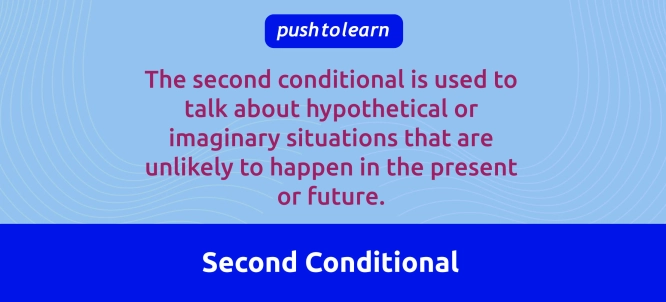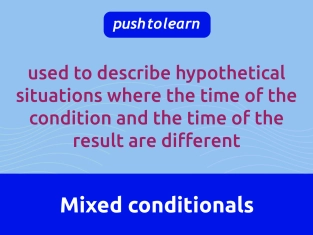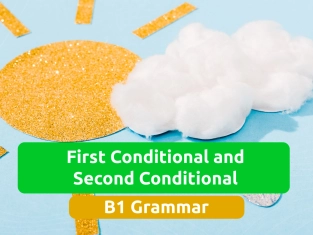by PushtoLearn
Second Conditional
Table of Contents
Second Conditional – Exercises
These exercises focus on Second Conditional
TLDR
✔️ Second Conditional = Imaginary situations (If + Past, Would + Verb)
✔️ NEVER use "would" in the if-clause!
✔️ Use "were" instead of "was" in formal English
✔️ "Could" and "might" are possible instead of "would"

What Is the Second Conditional?
The Second Conditional is used for:
✔️ Imaginary situations → "If I were rich, I would travel the world."
✔️ Unreal possibilities → "If she had wings, she could fly."
✔️ Advice & polite suggestions → "If I were you, I would take the job."
📌 Fun Fact: The Second Conditional talks about impossible or unlikely situations, while the First Conditional talks about possible ones!
Second Conditional Structure
👉 If + past simple, would + base verb
✔️ Examples:
-
If I won the lottery, I would buy a house. (Imaginary situation)
-
If she studied harder, she would get better grades. (Unreal possibility)
-
If we lived in Paris, we would eat croissants every day. (Hypothetical life)
📌 Tip: The "if" clause describes the condition (Past Simple), and the main clause shows the result (Would + Base Verb).
Variations of the Second Conditional
🔹 Using "could" or "might" instead of "would"
✔️ If I had more time, I could learn Spanish. (Ability)
✔️ If she tried harder, she might win. (Possibility)
🔹 Using "were" instead of "was"
✔️ If I were you, I would take the job.
✔️ If he were taller, he could be a basketball player.
📌 Tip: In formal English, we use "were" instead of "was" with I, he, she, it in Second Conditional sentences.
Second Conditional vs. First Conditional
|
Feature |
Second Conditional |
First Conditional |
|
Meaning |
Hypothetical or unreal situations |
Possible future situations |
|
Tense |
If + Past Simple, Would + Base Verb |
If + Present Simple, Will + Base Verb |
|
Example |
If I won the lottery, I would buy a house. |
If I win the lottery, I will buy a house. |
|
Certainty |
Very unlikely or impossible |
Possible |
📌 Tip: Use Second Conditional when something is unlikely or imaginary, and First Conditional when it’s realistic.
Common Mistakes in Second Conditional
|
Mistake |
Incorrect |
Correct |
|
Using "would" in the if-clause |
If she would study, she would pass. |
If she studied, she would pass. |
|
Using present tense in the if-clause |
If I win the lottery, I would buy a house. |
If I won the lottery, I would buy a house. |
|
Using "was" instead of "were" (formal English) |
If I was rich, I would travel. |
If I were rich, I would travel. |
|
Using First Conditional structure for unreal situations |
If I see a ghost, I would run away. |
If I saw a ghost, I would run away. |
📌 Rule: NEVER use "would" after "if"! The if-clause is always in past simple.
Compare other Conditionals: First Conditional, Third Conditional, Mixed Conditionals.
FAQ: Common Questions About the Second Conditional
Can I use "will" instead of "would"?
➡️ No! The Second Conditional uses "would", not "will."
❌ If I had more money, I will buy a car.
✅ If I had more money, I would buy a car.
Can I use "was" instead of "were"?
➡️ In formal English, use "were" for all subjects.
✔️ If I were you, I would accept the offer.
✔️ If he were taller, he could play basketball.
📌 But in informal English, "was" is sometimes used.
Can I use "could" or "might" instead of "would"?
➡️ Yes!
✔️ If I had more time, I could learn another language.
✔️ If it were warmer, we might go swimming.
What’s the difference between First and Second Conditional?
➡️ First Conditional = Possible Future
➡️ Second Conditional = Hypothetical (Unreal)
✔️ First Conditional: If I find $100, I will buy a gift. (Possible)
✔️ Second Conditional: If I found $100, I would save it. (Unreal)
Can I use "unless" in the Second Conditional?
➡️ Yes, but it’s rare!
✔️ Unless I had a car, I wouldn’t drive to work.
(= If I didn’t have a car, I wouldn’t drive.)

